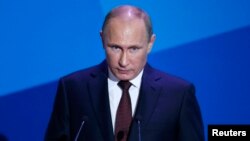VALDAI —
Russian President Vladimir Putin warned Ukraine on Thursday he would retaliate with protectionist measures if it signed a landmark trade deal with the European Union and suggested Kyiv enter instead into Russian-led customs union.
A day after Ukraine gave the go-ahead to sign agreements with the EU at a November summit in Lithuania, Putin made clear Moscow would hit back if its market were flooded by competitive goods from the EU because of Kyiv removing import duties.
“We would somehow have to stand by our market, introduce protectionist measures. We are saying this openly in advance,” Putin told a gathering of Russia experts and journalists.
He gave no details but said, “We will need to consider how many goods access our market and what protective measures we will have to take.”
Russian Prime Minister Dmitry Medvedev also criticized the former Soviet republic's “crafty” decision to chart a course away from its traditional close economic relationship with Russia, which is still Kyiv's biggest single trading partner.
Ukrainian Prime Minister Mykola Azarov said on Wednesday that the planned agreements with the EU raised the prospect of “a European quality of life” for his former Soviet republic, squeezed between Russia and the EU.
But Azarov said nothing about the imprisonment of his predecessor, Yulia Tymoshenko, whose release European envoys have been trying to secure in the run-up to the meeting in the Lithuanian capital of Vilnius.
The 28-member EU has condemned her trial for abuse-of-office and seven-year jail sentence as politically motivated, and her continued confinement threatens prospects of signing agreements that include the one on free trade.
Russia's pressure has injected new tension into Moscow's relationship with Ukraine, which has pleaded unsuccessfully for cheaper Russian gas to help its hard-pressed economy.
Azarov on Wednesday spelled out the trade advantages for Ukraine, whose economy is dominated by exports such as steel, chemicals and agricultural produce. He promised there would be softer duties on Ukrainian exports almost immediately.
But Putin said Ukraine had more to gain from joining the Customs Union grouping Russia, Kazakhstan and Belarus, saying they could join forces to press the EU for better trade conditions.
“What is the advantage of Ukraine signing the EU association agreement and opening up its markets? Yes, this will make its economy more liberal. But will the Ukrainian economy itself be able to cope with this liberalism? I don't know,” he said.
The pressure from Moscow forms part of a broader drive by Russia to deter former Soviet allies from edging out of its orbit and moving their economy and future trade towards the EU.
But Ukraine, a vast country with a population of 45 million and psychologically tied most closely to Russia by history and shared culture, is the sorest point of contention.
A day after Ukraine gave the go-ahead to sign agreements with the EU at a November summit in Lithuania, Putin made clear Moscow would hit back if its market were flooded by competitive goods from the EU because of Kyiv removing import duties.
“We would somehow have to stand by our market, introduce protectionist measures. We are saying this openly in advance,” Putin told a gathering of Russia experts and journalists.
He gave no details but said, “We will need to consider how many goods access our market and what protective measures we will have to take.”
Russian Prime Minister Dmitry Medvedev also criticized the former Soviet republic's “crafty” decision to chart a course away from its traditional close economic relationship with Russia, which is still Kyiv's biggest single trading partner.
Ukrainian Prime Minister Mykola Azarov said on Wednesday that the planned agreements with the EU raised the prospect of “a European quality of life” for his former Soviet republic, squeezed between Russia and the EU.
But Azarov said nothing about the imprisonment of his predecessor, Yulia Tymoshenko, whose release European envoys have been trying to secure in the run-up to the meeting in the Lithuanian capital of Vilnius.
The 28-member EU has condemned her trial for abuse-of-office and seven-year jail sentence as politically motivated, and her continued confinement threatens prospects of signing agreements that include the one on free trade.
Russia's pressure has injected new tension into Moscow's relationship with Ukraine, which has pleaded unsuccessfully for cheaper Russian gas to help its hard-pressed economy.
Azarov on Wednesday spelled out the trade advantages for Ukraine, whose economy is dominated by exports such as steel, chemicals and agricultural produce. He promised there would be softer duties on Ukrainian exports almost immediately.
But Putin said Ukraine had more to gain from joining the Customs Union grouping Russia, Kazakhstan and Belarus, saying they could join forces to press the EU for better trade conditions.
“What is the advantage of Ukraine signing the EU association agreement and opening up its markets? Yes, this will make its economy more liberal. But will the Ukrainian economy itself be able to cope with this liberalism? I don't know,” he said.
The pressure from Moscow forms part of a broader drive by Russia to deter former Soviet allies from edging out of its orbit and moving their economy and future trade towards the EU.
But Ukraine, a vast country with a population of 45 million and psychologically tied most closely to Russia by history and shared culture, is the sorest point of contention.





